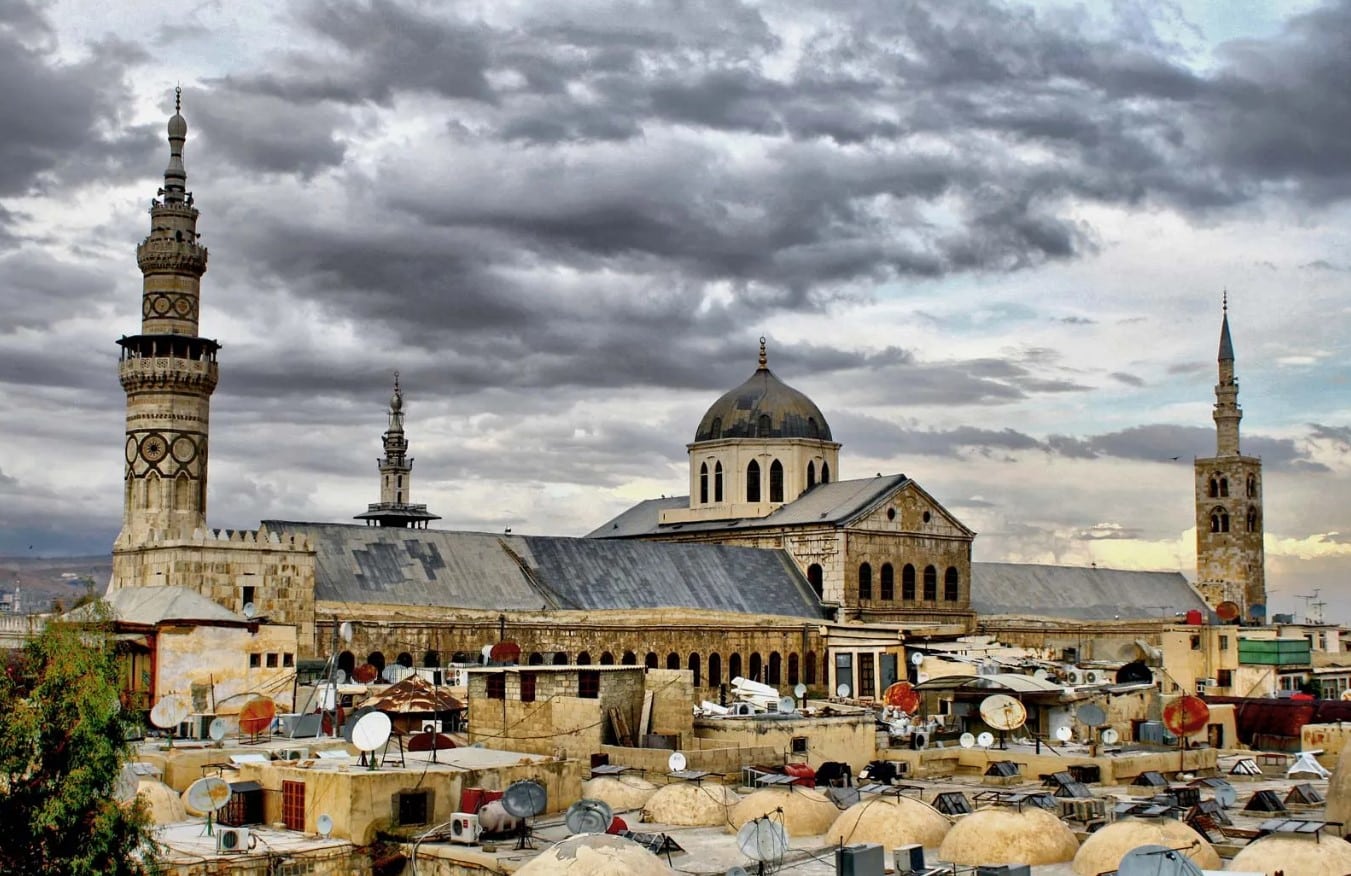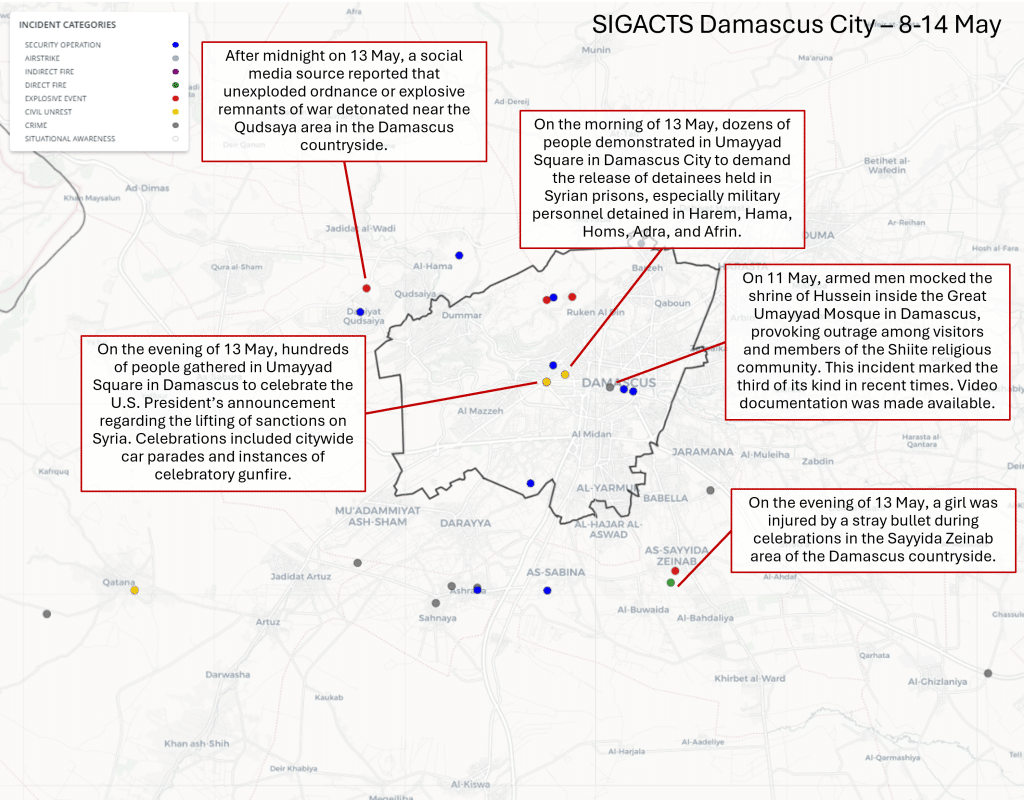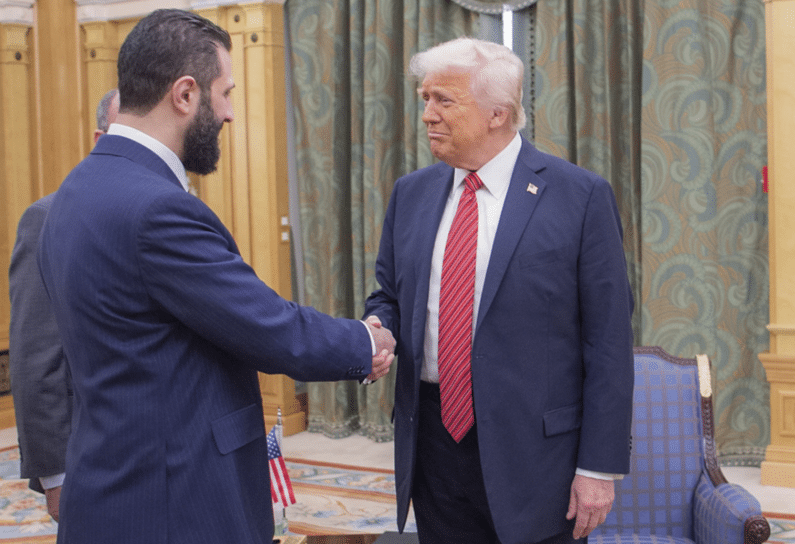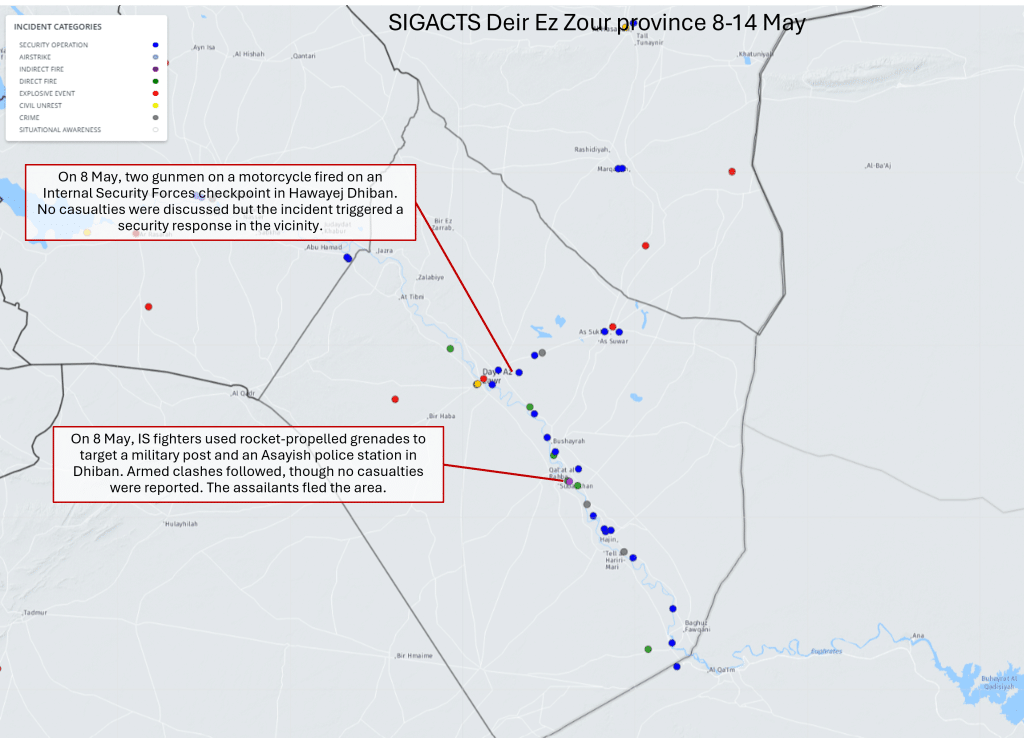Weekly Incident Map
Dear subscriber. Welcome to the Syria Weekly Report – a reporting service launched by Talos that provides high-quality information and analysis on Syria. The report is focused on broader strategic and political developments in the country, as well as Syria’s relations to regional stakeholders and surrounding countries. The report is complemented by a daily report.
This is a free sample of the service which is offered as a separate, stand-alone product outside your regular subscription. For inquiries regarding prices for a subscription, or the availability of bespoke reporting on Syria – including in-depth reports, risk assessments and incident data – please contact us here. Please also contact us if you are interested in transportation or other security services in Syria. In the meantime, please enjoy this complimentary service.
Executive Summary
-
Sectarian tensions and extrajudicial activity in Damascus as violence is subdued
-
President Trump unveils intent to lift sanctions on Syria
-
Timeline and conditions for sanctions lifting unclear
-
PKK announces end to armed struggle
-
Syrian president declines invitation to Arab League Summit
-
IS activity continues despite relative decline
Sectarian tensions and extrajudicial activity in Damascus as violence is subdued
The security situation in the capital was assessed as unchanged over the review period, with no significant attacks or incidents noted. The threat from explosive remnants remains a significant consideration however as incidents involving legacy devices continue. On 11 May, a 13-year-old boy sustained serious injuries when a landmine exploded in the Rummaneh area east of Dumayr City in the Damascus countryside. The victim was reportedly herding sheep at the time of the explosion and the incident underscored the importance of exercising high levels of caution, especially when transiting rural areas. Other hostilities over the week were limited but included the discovery of a body along the Damascus Airport Road on 9 May. Further details regarding the victim were limited but the incident is assessed likely related to a personal or local dispute.
Notable developments otherwise included incidents linked to assessed sectarian tensions, security operations and localized tension. According to video footage circulating on various media channels, unidentified armed men entered and hurled insults at the Shrine of Hussein inside the Great Umayyad Mosque in Damascus. The incident elicited strong reactions from visitors and on social media, with some sources describing it as the third incident affecting the shrine in recent weeks however this has not been verified by Talos. Regardless, the incident underscores elevated sectarian sensitivities, plausibly linked to deliberate efforts by some groups to stoke tensions following the recent escalation in Druze-dominated areas earlier this month.
According to multiple sources, forces linked to the Ministries of Interior and Defense also raided multiple restaurants in the Bab Touma area of Damascus as part of security operations. Local reports described members of the security forces entering and shouting, prompting unease amongst customers. While details are limited, this is assessed as part of purported morality enforcement efforts aimed at cracking down on venues involved in the sale of alcohol and other activities deemed at odds with conservative values. This forms a consideration for clients operating in the city who are advised to exercise caution as a result, especially at times of elevated tensions and religious sensitivities.
Separately on 8 May, local sources and other media sources reported that local armed groups seized dozens of homes in the Ash al-Warwar neighborhood, northeast of Damascus. Residents accused the neighborhood mayor of collaborating with these groups to facilitate the seizures. According to local sources, at least 50 properties were taken through intimidation and threats of arrest. Many residents refrained from legal action due to fear of reprisals. The armed groups justified their actions by claiming the properties were theirs or state-confiscated land. Most properties lacked formal ownership documentation, contributing to the seizures. Testimonies stated that some perpetrators were former residents who returned during post-war conditions and used force to reclaim property in the absence of legal oversight.
President Trump unveils intent to lift sanctions on Syria
In a surprising move this week, US President Donald Trump said he will be ordering a lifting of “all” US sanctions on Syria. Speaking at an investment forum in Riyadh, Trump said he “will be ordering the cessation of sanctions against Syria in order to give them a chance at greatness” while indicating that “all” sanctions would be lifted on the country. “It’s their time to shine. We’re taking them all off,” Trump said, “Good luck Syria, show us something very special.” The president made the remarks during a regional tour accompanied by a delegation of senior US business leaders and officials to promote US investments and economic engagement in the region.
The next day, the US President met with Interim President Ahmed al-Sharaa in Riyadh who Trump later described as a “tough guy” who has a “real shot at holding this together.” The meeting was also attended by Saudi Crown Prince Muhammad Bin Salman and (remotely) by Turkish President Recep Tayyip Erdogan, with both leaders assessed to have played a major part in promoting and facilitating engagement between the US and the new Syrian administration. For Turkey and Saudi Arabia, the lifting of international sanctions will undeniably unlock business opportunities in the country where they have already positioned themselves, alongside Qatar, as a key backer of the new administration.
The Syrian government and other regional stakeholders welcomed the move, and a statement by the Syrian presidency described the announcement as a “pivotal moment” for the Syrian people. The statement was greeted with celebrations across the country, with celebratory gatherings and parades reported across all of the major cities, as citizens expressed hope that the lifting of economic restrictions would revive the economy. The festivities were also followed by reports of casualties resulting from celebratory gunfire, as a large number of civilians were killed and injured by stray bullets. Multiple arrests were also conducted of individuals responsible for celebratory gunfire during the celebrations. While this underscores efforts to prohibit and mitigate the use of celebratory SAF, this serves as a reminder for client operations to exercise caution in connection with major festivities and celebrations.
Timeline and conditions for sanctions lifting unclear
President Trump’s decision to lift sanctions represents a major policy shift by the US, which, unlike European allies, has been cautious to engage the new government in Damascus. In his remarks on 13 May, President Trump indicated that the decision resulted from discussions with Saudi Crown Prince Bin Salman and President Erdogan, but it was also preceded by more frequent engagement between Syrian and US officials in recent months. In March, the US submitted a list of conditions that would facilitate an easing of restrictions but reports at the time suggested the discussions involved only a partial lifting of restrictions. In this context, President Trump’s order to lift “all” sanctions comes as a surprise.
The timeline and conditions for lifting the restrictions remain somewhat unclear however and details of the meeting with President al-Sharaa remain limited. In his remarks, President Trump did not stipulate any preconditions for removing the sanctions, but the White House Press Secretary Karoline Leavitt later said President Trump urged Syria to diplomatically recognize Israel; expel “foreign terrorists” from Syria; assist the US with counter-terrorism operations, and assume responsibility for IS detention centers in the northeast. To what extent these demands constitute conditions for sanctions relief remains unclear but some of these points were communicated by the US to the Syrian government as conditions to lift restrictions before the meeting on 14 May.
The timeframe is also unclear. The sanctions imposed on Syria involve a very complex set of legal and economic restrictions that date back several decades. While some restrictions can be lifted through presidential decree, others – like the Caesar Syria Civilian Protection Act of 2019 – will require Congressional approval. The designation of Syria as a “state sponsor of terrorism” (made in 1979) will likewise require both legislative and executive approval. With Congress’s position on the matter currently unknown, the timeline may be protracted but the President may proceed to lift those sanctions ordered by executive decree over the near term.
Later in the week, State Department Regional Spokesperson Michael Mitchell said that the sanctions “imposed by the US presidency” will be lifted immediately and reiterated the president’s wish to improve the situation in Syria. Separately, the foreign ministers of Turkey and Syria met with their US counterpart in Antalya, southern Turkey, on 15 May to discuss a “mechanism” for lifting the sanctions. While details remain limited, the state department announcement and subsequent meeting indicate intent to move forward with practical steps to implement Trump’s initial announcement. Notably, spokesperson Mitchell’s suggestion that sanctions “imposed by the president” will be lifted refers to those sanctions imposed by executive decree that can be lifted relatively quickly. Moreover, US Secretary of State Marco Rubio indicated after the meeting in Turkey that the president is considering issuing waivers under the Ceaser’s Act that would allow activities otherwise prohibited under the legislation to restart.
In another significant sign, the Governor of the Central Bank of Syria (CBS), Abdul Qader Hasriyeh, said that the bank had started working on reactivating the SWIFT system for international transfers, noting that more than 50 Arab and international banks had shown interest in opening branches and investing in Syria. Furthermore, he clarified that the current state of the Syrian banking sector and its capital cannot meet investment requirements. The governor added that the sanction lift will allow for a comprehensive reform of the banking sector and that the results of the sanction lifts could be seen within a period ranging from six months to a year. Further details regarding the decision to lift sanctions, its timeframe and implications will be provided in a forthcoming report by Talos.
PKK announces end to armed struggle
In another significant development this week, the PKK announced its formal dissolution and an end to the armed struggle against Turkey. The announcement formally marks the end of an insurgency lasting more than four decades and in its statement, the PKK echoed co-founder Abdullah Ocalan’s call in February for the group to dissolve and pursue Kurdish rights within the democratic and political process. The statement was made after a three-day conference held by the PKK in the KR-I and follows a ceasefire declared by the group on 1 March.
The domestic and regional reactions to the announcement were positive. In response, the Turkish government praised the announcement and Foreign Minister Hakan Fidan described the decision as “historic”. At the same time, the foreign minister said the government would closely monitor what steps the group takes. A spokesperson for President Erdogan wrote on social media platform X that the announcement marks a significant step towards the goal of a “terror-free Turkey.” At the same time, Turkish officials struck a tone of caution by emphasizing that the decision must apply to all PKK-affiliates without exception. In Syria, the reactions were also positive, as Foreign Minister Assad al-Shaibani said the announcement would “enhance regional stability” and congratulated Turkey on the achievement. The Commander of the Syrian Democratic Forces (SDF) also praised the decision and said the move will pave the way for a “new stage.”
The terms, conditions and discussions underpinning the piece initiative remain somewhat unclear as officials on both sides have revealed little in public. To recall, the peace initiative was first launched in October by Devlet Bahceli – a member of the Turkish far-right Nationalist Movement Party and a coalition partner to President Erdogan. At the time, Bahceli discussed the idea of granting Ocalan a conditional release in exchange for the PKK’s dissolution but Turkish government officials have repeatedly insisted that no concessions would be made to the group and that the government demands the PKK’s “unconditional surrender.”
Despite this, multiple sources have discussed a range of possible conditions and concessions that may have facilitated the PKK’s decision, including an amnesty for PKK members and the release of other, high-profile PKK elements currently held in Turkish prisons. Other demands likely focus on ways to enhance Kurdish rights in Turkey, including constitutional amendments to expand Kurdish-language education and easing the crackdown on the DEM Party and other Kurdish constituencies. As of writing, no such concessions have been granted and no significant pieces of legislation, amendments or other measures have been announced by the Turkish government that would explain the PKK’s decision to abide by Ocalan’s call. This is a potential issue as Kurdish leaders and PKK-affiliated elements have recently criticized the Turkish government for not doing enough to facilitate the peace initiative. A continued failure in this regard may set conditions for a resumption in hostilities and set back the process.
Other key issues are assessed to remain and may likewise prove challenging over the short-to-medium term. This includes the process of disarming and relocating active PKK elements, and the dismantling of PKK bases, logistical hubs and other sites. Some sources have speculatively suggested that PKK members recently engaged in armed operations will be offered amnesty and a supervised relocation within Iraq, or to a third country in Europe; however this remains unconfirmed. Besides logistical challenges, this is also politically sensitive as any concessions or amnesties granted to the PKK would likely face political backlash in Turkey.
The outlook for continued conflict is also linked to the possible formation of PKK splinter factions, who may be at odds with the decision and continue the armed struggle. Historically, armed insurgencies are usually followed by low-intensity activities by splinter factions and the same may well happen when it comes to the PKK, especially in the event that the Turkish government refuses to grant expected concessions. The coming period will therefore likely be characterized by caution on both sides as the implementation of the dissolution and other activities by PKK-affiliates is monitored.
The operational implications in Syria remain likewise to be seen and will be closely monitored, but the development is initially assessed as a positive indicator for the northeast. The dissolution of the group will likely facilitate the further integration of the SDF into the formal structure of the Syrian government and nominally reduce Turkey’s concerns about the SDF. This however will be contingent upon the future presence and role of the YPG, and PKK elements within the organization, and how these are integrated under the new military structure. As in Iraq, the dissolution may also reduce the outlook for Turkish airstrikes and military operations in the northeast, as the removal of the PKK threat should over time, remove any pretext for Turkey to conduct further operations. For now, Turkey has not announced an end to its military operations in Iraq or Syria, and the PKK decision is not expected to affect Turkey’s military posture over the short term.
Syrian president declines invitation to Arab League Summit
On 12 May, the office of Syria’s interim president Ahmed al-Sharaa announced that he would not be attending the upcoming Arab League Summit in Baghdad. Instead, the government in Damascus will be represented by Foreign Minister Assad al-Shaibani. Iraqi media reports citing Iraqi government officials also confirmed that the interim president would not be attending the summit. No official reason for the declined invitation was provided by the Syrian presidency but the government sources cited in Iraq denied that the decision was linked to security considerations.
To recall, al-Sharaa’s invitation was met with strong reactions in Iraq due to the interim president’s historical links with al-Qaeda in Iraq. Last month, a large number of Iraqi MPs called for al-Sharaa’s arrest, citing an alleged arrest warrant against him, while demonstrations denouncing the invitation have been reported regularly. This, combined with the Syrian government’s lack of response, fuelled speculation over his attendance and the decision to decline the invitation does not come as a surprise. While this is assessed to reduce the outlook for demonstrations, Foreign Minister al-Shaibani’s attendance is also not unproblematic and his last visit to Baghdad likewise sparked protests. Related dynamics and reactions will therefore be important to monitor in the coming days, as well as the effects on Iraq-Syria relations. This is particularly significant in the context of efforts to repatriate IS members from Syria as relations between the two sides may impact the speed and facilitation of this process.
IS activity continues despite relative decline
A statistical decline in IS activity was observed over the week in comparison to the previous reporting period in the eastern provinces, yet IS attacks were recorded in the beginning of the review period in Deir Ez Zour province. On 8 May, the media office of the Syrian Democratic Forces, the Syrian Observatory for Human Rights, and other media sources reported two attacks by Islamic State cells in Deir ez-Zor Governorate. In the first incident, two gunmen on a motorcycle fired on an Internal Security Forces checkpoint in Hawayej Dhiban. In the second attack, IS fighters used rocket-propelled grenades to target a military post and an Asayish police station in Dhiban. Armed clashes followed, though no casualties were reported. The assailants fled the area. The incidents occurred one day after two additional IS attacks in Jdeidet Akidat and Dhiban.
Like the attack activity discussed the previous week, the capabilities involved in these attacks are consistent with standing trends and continue to comprise small arms, grenades and RPG assets. The majority of attacks remain confined to rural areas, targeting civilians and SDF-elements stationed in exposed positions, and there are as of yet no indications of increased capability to conduct high-profile attacks against civilian population centers and urban areas. The frequency of incidents has certainly increased however and forms a concern in the eastern provinces, especially in the context of the ongoing US troop withdrawal.
As of writing, the future posture of the coalition forces remains unclear and so far the redeployments reported have been conducted internally, with coalition forces moving from Deir ez Zour to Hasaka province. Talos has not verified any movements across the Syria-Iraq border, but the US appears committed to its plans to reduce the troop strength by half during the ongoing drawdown. At the same time, the US is pushing the interim government to assume control over detention camps and take on a greater role in counter-terrorism operations – demands that may be difficult to implement in practice without improved coordination between the SDF and Damascus. Regardless, the US withdrawal does raise the outlook for security gaps in the east and adds a level of uncertainty to efforts to combat IS in the east.






